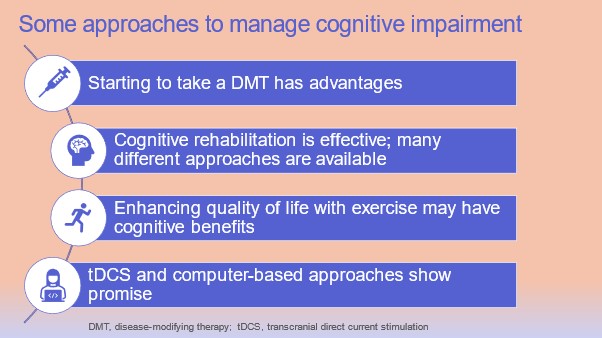Multiple sclerosis and cognition – recent findings
Reviewed by Gavin Giovannoni, Professor of Neurology, Blizard Institute, Barts and The London School of Medicine and Dentistry, UK, and Chair of MS Brain Health Steering Committee
Multiple sclerosis and cognition
Evidence of the potential benefits from understanding the cognitive status of each person with multiple sclerosis (MS) early in the disease course is now growing. Identifying cognitive deficits early allows healthcare professionals to better determine the prognosis of the patient and to offer targeted strategies that can promote cognitive reserve, which is a key aim of clinical management. Maintaining high levels of cognitive reserve has been shown to improve cognitive performance in verbal and spatial memory, attention, processing speed, verbal fluency and inhibitory control.1
In 2018, an expert group convened by the US-based National MS Society published a consensus on optimal strategies for screening, monitoring and treating cognitive changes, with the aim of addressing barriers to optimal care.2 Among other measures, they recommended baseline screening with a validated screening tool when the patient is stable, as well as annual reassessment with the same tool for all adults and children aged 8 years or older.2
A range of validated cognitive screening tests is available; some can be administered in a relatively short time by non-specialist practitioners. BICAMS (Brief International Cognitive Assessment for MS) is widely used in daily clinical practice; and the SDMT (Symbol Digit Modalities Test) also provides a useful measure of cognitive processing speed during routine screening and in clinical trials. People with MS can also complete tests like the MSNQ (MS Neuropsychological Questionnaire) or the PDQ (Perceived Deficits Questionnaire) themselves, as part of consultations.
Drug and non-drug interventions can help to minimize cognitive deterioration. Disease-modifying therapies (DMTs) may be effective in improving cognitive test performance in relapsing–remitting MS.3 There is no consensus in the literature that drug treatments improve cognitive function in MS;4 however, treatment with sphingosine-1-phosphate (S1P) receptor modulators has recently been shown to improve cognitive processing speed in people with secondary progressive MS.5,6 Several comorbidities (particularly disorders of sleep and mood), as well as concomitant medications (for example anticholinergic medications and drugs to improve spasticity), can make cognition worse.2 These aspects of management should therefore be optimized to maintain cognitive function in people with MS.

Cognitive rehabilitation techniques have proved successful in many people with MS. ‘Compensatory’ approaches use context and visual imagery training, as well as external and internal aids and self-generated learning techniques. ‘Restorative’ rehabilitation approaches mainly use computer-based programmes to improve memory, attention and processing speeds.7
The benefits of exercise on cognition in MS are not clear-cut.8 In the general population, exercise has been shown to have beneficial effects throughout life; lessons learned from the wider population can therefore be applied to develop suitable exercise programmes for people with MS. A multi-arm trial is investigating the effect of cognitive rehabilitation and aerobic exercise in 360 people with progressive MS.9 The hope is that these two interventions will be beneficial and can be extended to multiple countries and made available in different languages.
A technique called transcranial direct current stimulation (tDCS) uses a gentle electrical current to improve symptoms such as fatigue, sleep problems and concentration difficulties by stimulating a specific brain area. In people with MS, early evidence suggests that tDCS has a favourable effect on cognitive processing speed, mood disturbance, pain and fatigue.10,11 Its effects on cognition and fatigue vary, based on the specific assessment used.
Clinical trials in MS have, to date, assessed some, but not all, of the important aspects of cognition. The use of more extensive cognitive outcome measures and widely accepted, standardized criteria in trial design (such as those developed by the American Association of Neurology12) would provide a firmer basis for future management recommendations.4 Future clinical trials, particularly in progressive MS, are likely to incorporate cognition as an outcome measure to assess the efficacy of DMTs.
References
1. Santangelo G, Altieri M, Enzinger C et al. Cognitive reserve and neuropsychological performance in multiple sclerosis: a meta-analysis. Neuropsychology 2019;33:379–90.
2. Kalb R, Beier M, Benedict RH et al. Recommendations for cognitive screening and management in multiple sclerosis care. Mult Scler 2018;24:1665–80.
3. Landmeyer NC, Bürkner PC, Wiendl H et al. Disease-modifying treatments and cognition in relapsing-remitting multiple sclerosis: a meta-analysis. Neurology 2020;94:e2373–83.
4. Chen MH, Goverover Y, Genova HM et al. Cognitive efficacy of pharmacologic treatments in multiple sclerosis: a systematic review. CNS Drugs 2020;34:599–628.
5. Benedict RHB, Tomic D, Cree BA et al. Siponimod and cognition in secondary progressive multiple sclerosis: EXPAND secondary analyses. Neurology 2021;96:e376–86.
6. DeLuca J, Schippling S, Montalban X et al. Effect of ozanimod on Symbol Digit Modalities Test performance in relapsing MS. Mult Scler Relat Disord 2021;48:102673.
7. Benedict RHB, Amato MP, DeLuca J et al. Cognitive impairment in multiple sclerosis: clinical management, MRI, and therapeutic avenues. Lancet Neurol 2020;19:860–71.
8. Sandroff BM, Motl RW, Scudder MR et al. Systematic, evidence-based review of exercise, physical activity, and physical fitness effects on cognition in persons with multiple sclerosis. Neuropsychol Rev 2016;26:271–94.
9. Feinstein A, Amato MP, Brichetto G et al. Study protocol: improving cognition in people with progressive multiple sclerosis: a multi-arm, randomized, blinded, sham-controlled trial of cognitive rehabilitation and aerobic exercise (COGEx). BMC Neurol 2020;20:204.
10. Hsu WY, Cheng CH, Zanto TP et al. Effects of transcranial direct current stimulation on cognition, mood, pain, and fatigue in multiple sclerosis: a systematic review and meta-analysis. Front Neurol 2021;12:626113.
11. Charvet L, Shaw M, Dobbs B et al. Remotely supervised transcranial direct current stimulation increases the benefit of at-home cognitive training in multiple sclerosis. Neuromodulation 2018;21:383–9.
12. Gronseth GS, Cox J, Gloss D et al. on behalf of the Guideline Development, Dissemination, and Implementation Subcommittee of the American Academy of Neurology. Clinical Practice Guideline Process Manual. 2017, American Academy of Neurology, Minneapolis, MN, USA.
